- Home
- Patricia Highsmith
The Cry of the Owl Page 8
The Cry of the Owl Read online
Page 8
“You mean it’s in Langley? For Robert Forester?”
“Yes. It’s a Langley number, but an unlisted one.”
“Thank you.”
Greg didn’t know Robert was still in Langley, Jenny thought. Greg had called her two weeks ago, saying triumphantly that Robert had left town, but he must have based that on the fact that his old number wasn’t working. Maybe the operator Greg had got hadn’t said that Robert had an unlisted number. She could call Robert at his office, since he was probably still working there. She went to bed thinking of this, though she knew that by the light of day she might think better of it and decide that calling him was the wrong thing to do.
She called him the next morning at eleven, going out of the bank on a pretext during her coffee break, because they had an electric percolator in the room behind the vault. Two people talked to her, a woman and a man, before Robert came on.
“Hello, Robert. How are you?” she asked.
“Oh, fine, thank you. And you, Jenny?”
“I didn’t know you were still in town until last night.” She pressed the receiver hard against her ear. “I called your old number.” All the casual, cheerful things she had planned to say to him had vanished.
“Well, I moved. To a house.”
“You’re really all right?”
“Yes, of course. Better than when you saw me last, I think.”
“You’re divorced now?”
“Yes. I got it.”
“Robert, I’m so sorry Greg called you. It seems all I do is apologize for Greg.”
“Oh, that was a long time ago, a month ago, wasn’t it? I only wish he hadn’t called New York.”
“I gave him hell for that. I haven’t seen him—not since the day he crashed in on our dinner.” She stopped, wanting to say that since he had his divorce, couldn’t they see each other? She remembered what he had said about seeing her, liking to look at her through the kitchen window. That was the way she felt about him. She simply wanted to see him.
“I suppose I’d better go now, Jenny. Thank you for calling me.”
They had hung up before she knew it. She reproached herself for blurting that out about the divorce: she wasn’t supposed to know that. It had embarrassed Robert, she could tell. And Robert was not at all interested in the fact that she hadn’t seen Greg.
When her work was finished at four-thirty-five, Jenny drove to Langley. The sun was setting and it was already dusk. The people at Langley Aeronautics got out at five, Jenny supposed, and she knew it would probably be hopeless to find Robert’s car among the hundreds of cars, but he would be there, somewhere, maybe a quarter of a mile away from her, but maybe nearer. The Langley Aeronautics parking lot looked like one of the used-car lots she had passed coming in. There was even a policeman directing traffic out of the place, through the wire gates. And there were at least three exits. Robert’s car was a black convertible with chrome braces on the sides of the top—not many cars like it, but there were so many cars. She drove slowly past the exits until only twenty or so cars were left in the lot, but she did not see Robert’s car. At last, she drove home. She was invited to the Tessers’ for dinner at seven, and she was not looking forward to the evening. The Tessers thought she was depressed because of the breakup with Greg—which they didn’t understand—and they kept trying to cheer her up. She had not told them about Robert. But she might tonight. She had to tell somebody.
The telephone was ringing when she opened her door, and she hoped it might be Robert, but it was Greg. There was a concert on at the Langley Auditorium on Washington’s birthday, and Greg wanted to take her. She thanked him and said no.
“How long is this going to go on, Jenny? I’ve given you over a month now. What’re you doing, carrying a torch for Mr. Forester or something? Are you thinking of going to New York after him?”
“I just want to be left alo-one, Greg.”
“Who’re you seeing? Susie? Some of her boy friends?”
“No!”
“All right, little girl. I love you. But there’re times when I think you need a good spanking. You’ll hear from me again.”
That was on a Thursday evening, and she heard from him in a letter on Saturday. The letter was four pages long on the typewriter, reaching a crescendo on page four when he talked about her unfeeling attitude in refusing to see him for so long, and pointing out that he had been complying with a superhuman patience that very few other men would be willing or able to show.
On the following Tuesday evening, the fourth or fifth time Jenny had tried to find Robert’s car at the Langley Aeronautics plant, she saw it. He turned north out of an exit, six other cars were between them, but she saw his car make a left turn after half a mile. It was a road away from the town that led immediately into farmland. She kept considerably behind him, as there were no cars between them now. She wanted only to see his house and know where it was. His red tail lights turned right and stopped, and the headlights lit up a small house with a peaked roof. She slowed, saw Robert get out, leaving his lights on, and start toward the house. Then she was nearly at his driveway, and she went even slower, wanting to be seen, wanting to be hailed. It was a short driveway.
“Jenny?” he called.
She turned in at his driveway and stopped, watching him walk toward her. He was smiling, surprised, but he looked friendly, not annoyed.
“So it’s you,” he said. “Something the matter?”
“No.”
“Well—want to get out? Come in.”
She turned off the ignition, got out, and walked with him toward the house. The door was on the driveway side, a door with diamond-shaped panes of glass in its top half. The columns of the little porch roof were carved in grooved spirals. It was black and brown, that was all she could see, and she hardly took that in because she was conscious only of Robert, and that she could not find a word to say to him, not an apology, not a joke, nothing.
He put on a light inside the door. “Enter. I’ll be right with you.” He went out to shut off his car lights.
The room looked like the main room of a medieval castle. There was a fireplace on the left ten feet high, making the mantel impossible to use as a mantel, and a Shakespearean-looking couch with a red cover against one wall. Upstairs on the balcony was the bedroom, evidently, as the living room took up almost all the bottom floor.
“Funny place, isn’t it?” Robert said, smiling. “I like it.”
“It’s like something out of a fairy tale.”
“Let me take your coat.”
He hung her coat in a closet with his, then went to the fireplace where wood was laid ready to be lighted, taking up an absurdly small space in the wide fireplace. He struck a match to the paper under the wood, then opened the flue. Then he turned on a lamp on a table in the center of the room, and turned off the top light. The table was covered with drawings of machinery in pencil and ink.
“Sit down. Would you like a drink?”
She sat down in a leather armchair close to the fireplace.
“Say, you’re not exactly talkative tonight.” He went off to a doorway that led into a blue kitchen.
She followed him. The kitchen was small, but very neat and clean. He got out ice and measured the Scotch by jiggers into highball glasses. He glanced at her twice over his shoulder, and she was reminded of the time he had come to her house, when she had been—she had to admit—just a little scared as she glanced at him. Now he was smiling and he looked happy. He handed her a glass, and they went back to the living room. She noticed he had a record player now, and there was a rack of L.P.s under it.
“You look as if you’re really installed here. Did you sign a lease?” she asked, and instantly hated herself for the banality of it. She drank three large gulps of her Scotch.
“Yes, for a year. A hundred and twenty-five a month, heat included. Not bad, do you think?” He looked at her with smiling eyes. He was sitting on a hassock by the fire.
“Not too much room,” she said
critically, looking up at the sharp inverted V of the ceiling.
“I don’t need any more. I’m glad you came by. It’s a little lonely out here. Not like living in an apartment building.”
He didn’t look lonely at all, she thought. Then she thought of the divorce. “I’m sorry I said anything about your divorce. I only knew through Greg.”
His smile went away, then came back. “It doesn’t matter. I’m glad about the divorce. The nice thing is I’m sure Nickie’s happier, too, so it’s all for the best. How’s Greg? Have you seen him?”
“I told you,” Jenny said, “I haven’t seen him since that Sunday we went skiing.”
“Oh.” He put another log on.
Jenny looked at his shelves of books beside the fireplace. Most of them had new jackets. There was lots of history and biography. He took her glass from her hand.
“Like another? Or not?”
“Yes, please, I would.”
The drinks went quickly to her head, making her relaxed and sad. She might, she thought, say or do something wrong that would make Robert dislike her and never want to see her again. She could see Robert beginning to look worried because she was quieter and quieter, and then he proposed she stay for dinner, because he had a steak big enough for two that he could cook over the fire, and she said she would stay. Then she found her dull, practical mind wondering if the steak were already thawed or not, and the next thing she knew, Robert was wrapping potatoes in foil, kneeling in front of the fire, and the steak was lying on a grill ready to be put on, and it was obviously thawed.
“Can I make a salad? I’m very good at salads.” She stood up unsteadily and felt her silly smile spreading lopsided all over her face, and she felt she was looking and acting like sixteen, and hated herself for it.
But in the kitchen she forgot her self-consciousness as she mixed a dressing in Robert’s dark wooden salad bowl. He had garlic and onion and herbs of all kinds. He had tied around her a denim apron like a carpenter’s apron, and she remembered the quick touch of his hands at her waist. Her salad was elaborate, and by the time she was finished, the steak and potatoes were done, and Robert had set the table at one side of the living room, though she had meant to do that. There was also a bottle of red wine on the table with a French label.
During the dinner, Robert talked about his work and said there was a possibility that he might go to Philadelphia, where Langley Aeronautics’ main plant was. Robert was working on a combination of two parts of something that went into a helicopter engine, and those were the drawings of it on his writing table. He showed her one and Jenny tried to understand it, but she saw it double. Probably because she said so little about it, he showed her a portfolio of insect drawings—the only one she’d ever heard of was the praying mantis, which looked terrifying in Robert’s drawing. Robert said the drawings were for a book, and he was about to mail them all to New York. Then she was mortified, because Robert gave up talking about his work and asked her if she had been to the concert of Mozart and Stravinsky at the Langley Auditorium, and Jenny said she hadn’t, though she did not say that Greg had invited her to go. She had attacked her steak with gusto at first, but suddenly she could not eat any more. Over her salad, she felt like weeping.
“Robert, I love you,” she said in the middle of something he was saying.
He made a sound between a laugh and an exclamation of surprise, and then she was sitting on the red couch, leaning back against several pillows. Robert was saying in a very steady tone, “. . . some coffee. Here. It’s good strong espresso. I shouldn’t have given you that second Scotch. But you haven’t had much. You’ll feel better in a minute.”
Words, words, words went through her head and she could not utter any of them.
Robert was walking up and down with a cigarette, stopping at the round coffee table to sip from his cup. She thought, we’re married and we live here, and I’m quite used to going to bed in the same bed with Robert, and he’s quite used to me. She watched his figure turn and turn again, his footsteps almost soundless on the carpet. He was not looking at her. He threw his cigarette into the fireplace. She closed her eyes on the moving white of his shirt and slept. She awakened at his touch on her shoulder. He had put a plaid lap rug over her, and he was sitting by her on the couch.
“Feeling better? It’s only eleven-thirty. I thought you might want to go home.”
“I don’t want to go home.”
“Oh—well—sleep down here. No sheets, but I can put some on in a minute.” Then he looked confused, wandered to the chair where a book lay face down on the seat. He closed the book and put it on a table. The fire was a bed of orange-red embers. He turned to her, looking at her as if he expected her to change her mind, to have waked up more and to say that she would be going, after all.
“Do you have any pajamas?” she asked.
“I guess so. They’ll be big.”
She took a shower, mechanically washed her stockings and hung them over the shower rod, used toothpaste and scrubbed her teeth with her finger, wanting to use one of his two toothbrushes, but not daring. Her shame at having invited herself had become something else—a prolonged act of audacity she had to carry through, something she might wince at thinking about later. When she came out of the bathroom, Robert was standing in robe and pajamas, holding a glass of milk.
“I thought you might like this,” he said.
“No, thanks. I’d like another glass of wine.”
He went to get it from the kitchen. She stood watching him pour it into one of the stemmed glasses they had used at the table. The kitchen was tidy again. He had done the dishes. She set the wineglass on the coffee table he had pulled up by the bed, got into bed and sipped the wine. Robert pulled another piece of wood on the embers.
“Not that you’ll need it for warmth, I hope, but it looks nice,” he said. “What time would you like to get up?”
“Seven-thirty.”
“Fine. That’s my time, too. Good night, Jenny.”
“Good night.”
He stood looking at her, his head slightly tilted, his face smiling, his hands in the pockets of his robe. To Jenny, it was perfect, whether he wanted to kiss her or not, it was perfect just to be in a bed in his house, to be in a house in which he slept and in which they breathed the same air. She closed her eyes. She was lying on her stomach, her cheek on one hand, and she meant to open her eyes and see him again, standing in his blue striped robe. When she opened her eyes, it was dark and he was gone, and only a glow came from the balcony upstairs. She felt that no more than five minutes had passed. But time had disappeared. Maybe she would stay awake all night and maybe she would sleep. Both possibilities were pleasant. It was neither night nor day. She felt simply that she existed. The right word for it was eternity.
9
On the evening when Greg noticed that Jenny’s car was not at her house by one A.M., that her house was dark, he went back to his apartment in Humbert Corners and waited until twenty of two, then drove by again. Her car was still not there. Neither was it at Susie Escham’s. He had driven by Susie’s at nine to have a look, and also at midnight. Greg’s first thought was that she had gone to New York to see Robert Forester. Or somewhere else to have a rendezvous with him. Or was it possible she’d be spending the night at the Tessers’? Not very likely. She never had, as far as Greg knew. He called Susie at two o’clock. He realized it was a rude hour to call, but he wanted Susie to know he was upset. Susie knew very well how he felt, and she was on his side.
“No, I haven’t seen her,” Susie said, speaking in a whisper, because her family was asleep, she said, and the telephone was in the hall.
“I’ve got a feeling she’s with Robert. Who else? Even the movie lets out at eleven-thirty, even in Langley. She’s never out this late on a weekday night.”
“I thought Robert went back to New York.”
“New York’s only two hours away, isn’t it?”
“How about the Tessers?”
; “I don’t feel like calling them to find out.”
“Want me to?”
“Mm-m, no, thanks, Susie,” Greg said miserably.
“Gee, Greg, I wish I could help you. You really love her, don’t you?”
“I certainly do.”
Three minutes later, he was talking to the former Mrs. Forester in New York. From her he learned that Robert was still in Langley and still working for Langley Aeronautics.
“He told me he was leaving town,” Greg said. “Did he tell you he was staying on in Langley?”
“No, but that’s my guess. He was in New York a few weeks ago to sign the divorce papers, but I didn’t see him. My lawyer didn’t say anything about his moving,” she said languidly. She had said she was in bed, but that she hadn’t minded at all being awakened.
“You don’t know where he lives in Langley, do you? He changed his phone number and they won’t give it out.”
“I haven’t the foggiest and I couldn’t care less,” she said, blowing smoke into the telephone. “But the situation interests me. Absolutely typical of something Robert would get himself into. A sloppy, sneaky love affair.”
“Well, I hope it hasn’t gone that far. I love that girl. If I get my hands on that guy … I know Jenny and she’s got a crazy crush on him and—I don’t know how to put it, but she’s such a romantic kid. When she gets her mind made up about something—”
“He’s a maniac. She’d better watch out.”
“So you said. That’s got me worried. And with him in Langley—”
“Listen, Greg, keep me posted, will you? And anything I can do to help I’ll be glad to. O.K.?”
Greg was much reassured by the conversation. He felt he had an ally in the former Mrs. Forester and the best possible source of information about Robert. The first time he had called her she had asked him to call her Nickie. Nickie Jurgen now. She had married again. Greg had the feeling it might be a long tough fight to get Jenny back, but that he’d win—whether she was with Forester tonight or not. He turned on his radio, lit a cigarette and pushed off his shoes. Did Langley Aeronautics have a night shift? It was worth a try. He looked up the number in his telephone book and called it. There was no answer. Tomorrow morning he’d call them and ask for Forester’s address. If they wouldn’t give it out, there were other ways—dry cleaners’ shops, for instance, dairy companies in Langley who would know where he lived. Greg rubbed his big right fist and got up from the couch. A good sock on the jaw might provide the kind of discouragement Robert Forester needed. It had worked for Greg before—not really worked, he had to admit, with the two girls in Philly, but it had given him a great satisfaction to knock his two rivals out cold.

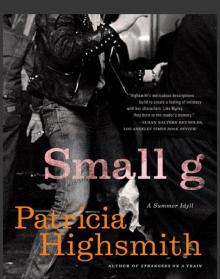 Small G: A Summer Idyll
Small G: A Summer Idyll The Boy Who Followed Ripley
The Boy Who Followed Ripley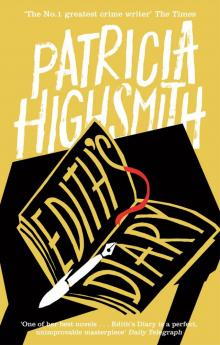 Edith's Diary
Edith's Diary Ripley's Game
Ripley's Game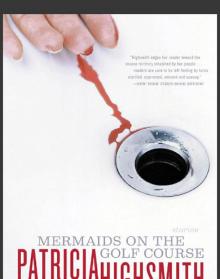 Mermaids on the Golf Course: Stories
Mermaids on the Golf Course: Stories Slowly, Slowly in the Wind
Slowly, Slowly in the Wind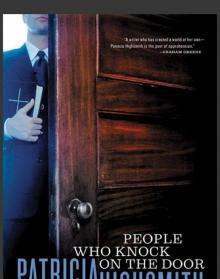 People Who Knock on the Door
People Who Knock on the Door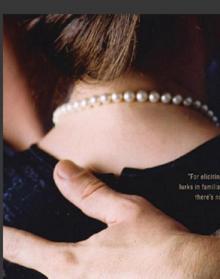 The Glass Cell
The Glass Cell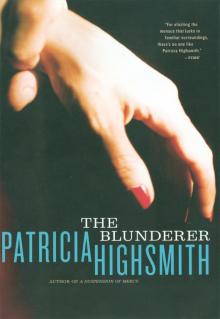 The Blunderer
The Blunderer Those Who Walk Away
Those Who Walk Away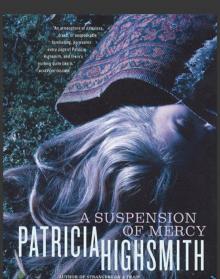 A Suspension of Mercy
A Suspension of Mercy Eleven
Eleven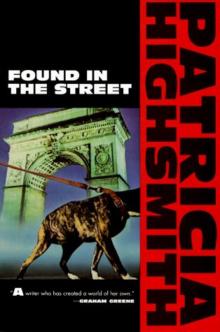 Found in the Street
Found in the Street Ripley Under Ground
Ripley Under Ground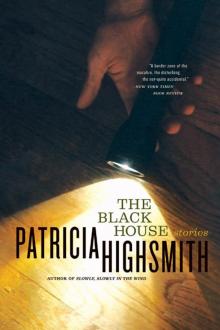 The Black House
The Black House The Cry of the Owl
The Cry of the Owl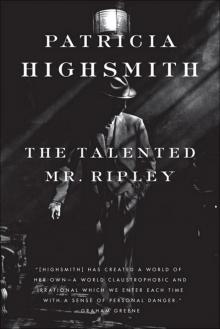 The Talented Mr. Ripley
The Talented Mr. Ripley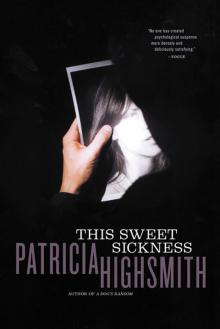 This Sweet Sickness
This Sweet Sickness The Two Faces of January
The Two Faces of January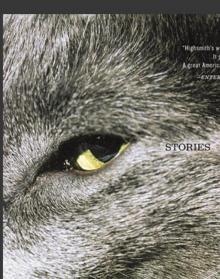 The Animal-Lover's Book of Beastly Murder
The Animal-Lover's Book of Beastly Murder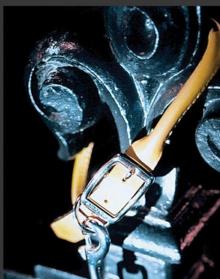 A Dog's Ransom
A Dog's Ransom Deep Water
Deep Water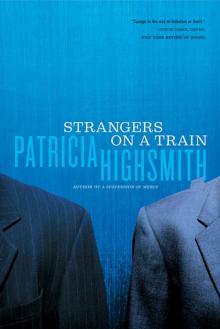 Strangers on a Train
Strangers on a Train Ripley Under Water
Ripley Under Water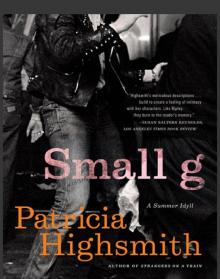 Small g
Small g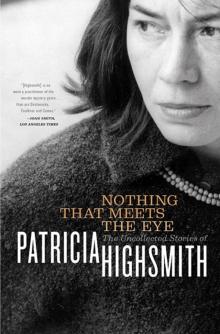 Nothing That Meets the Eye
Nothing That Meets the Eye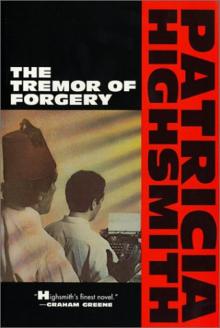 Patricia Highsmith - The Tremor of Forgery
Patricia Highsmith - The Tremor of Forgery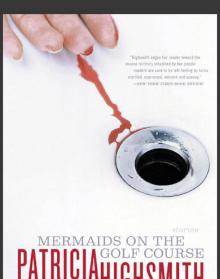 Mermaids on the Golf Course
Mermaids on the Golf Course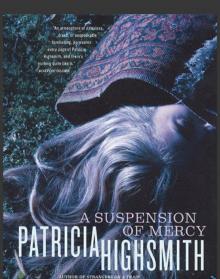 Suspension of Mercy
Suspension of Mercy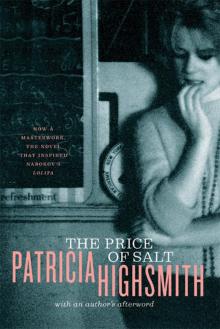 The Price of Salt, or Carol
The Price of Salt, or Carol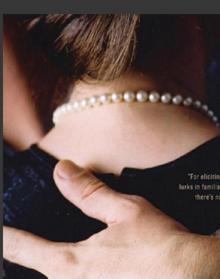 Glass Cell
Glass Cell